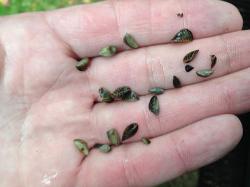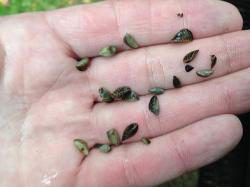
DULUTH – ENVIRONMENT – The Department of Natural Resources has confirmed four new reports of zebra mussels in Minnesota lakes: Lake Sallie in Becker County; Lake Andrew in Douglas County; Lac qui Parle in Chippewa, Lac qui Parle and Swift counties; and Big Birch Lake in Todd and Stearns counties.
“New zebra mussel infestations are often discovered at the end of the boating and fishing season, when docks and lifts are being taken out of the water,” said DNR invasive species unit supervisor Heidi Wolf. “It is important to carefully check for zebra mussels on docks and lifts, and Minnesota law requires that they be allowed to dry for at least 21 days before they can be placed in another body of water. If docks and lifts can be left out of water over winter before being installed in a new water, that’s optimal.”
DNR invasive species specialists confirmed zebra mussels at three locations in Lake Sallie in Becker County. The initial report came from a lake property owner who spotted a half-inch zebra mussel on his dock. Lake Sallie is downstream of Detroit Lake, where zebra mussels were confirmed earlier this year.
DNR invasive species specialists confirmed zebra mussels on offshore buoys in Lake Andrew in Douglas County. In follow-up searches, DNR staff confirmed additional zebra mussels at a public access about a mile from the first confirmed site.
Invasive species specialists also confirmed zebra mussels in Lac qui Parle Lake, a reservoir on the Minnesota River in western Minnesota. The reservoir flows through portions of Chippewa, Lac qui Parle and Swift counties. DNR staff are conducting searches on waters downstream of the reservoir.
DNR invasive species specialists confirmed one adult zebra mussel at the county access on the southeast side of Big Birch Lake, in Todd and Stearns counties. Numerous young zebra mussels were found at a lakeshore property about one-third mile from the access.
Zebra mussels are an invasive (non-native) species that can compete with native species for food and habitat, cut the feet of swimmers, reduce the performance of boat motors, and cause expensive damage to water intake pipes.
Less than two percent of Minnesota’s 11,842 lakes are listed as infested with zebra mussels. To protect the state’s waters from the spread of invasive species and the environmental, recreational and economic damage they cause, Minnesota law requires boaters and anglers to:
Clean their watercraft of aquatic plants and prohibited invasive species.
Drain all water by removing drain plugs and keeping them out during transport.
Dispose of unwanted bait in the trash.
Some invasive species are small and difficult to see at the access. To remove or kill them, take one or more of the following precautions before moving to another body of water, especially after leaving infested waters:
Spray with high-pressure water.
Rinse with very hot water (120 degrees Fahrenheit for at least two minutes or 140 degrees Fahrenheit for at least 10 seconds).
Dry for at least 5 days.

